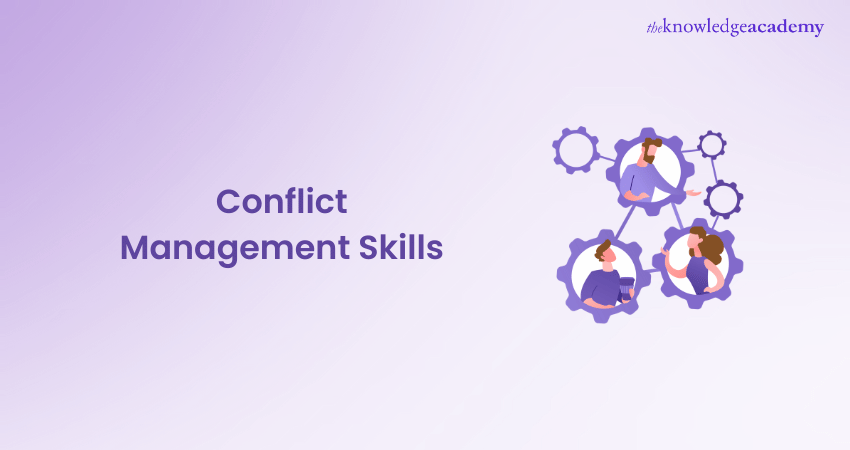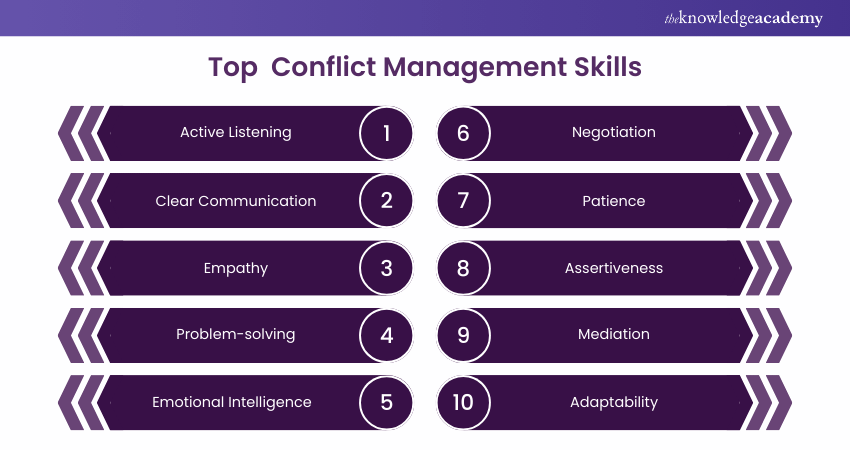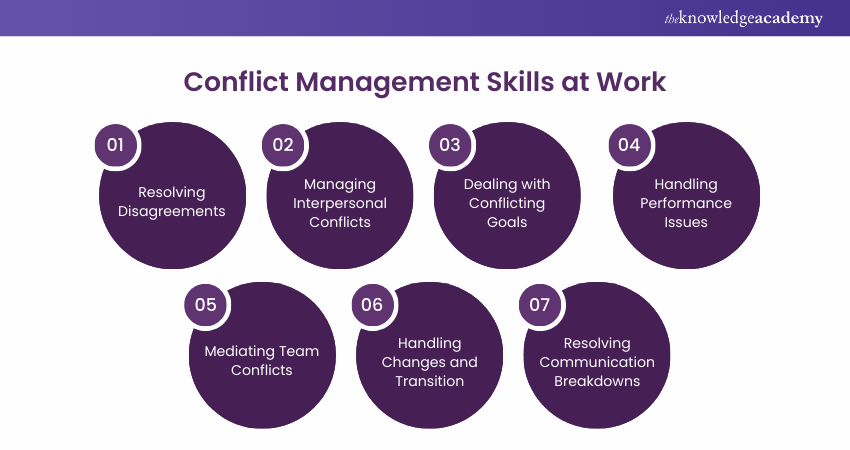We may not have the course you’re looking for. If you enquire or give us a call on +352 8002-6867 and speak to our training experts, we may still be able to help with your training requirements.
We ensure quality, budget-alignment, and timely delivery by our expert instructors.

Mastering the art of handling conflicts is essential in both personal and professional realms. Conflict Management Skills empower us to resolve disagreements smoothly, fostering stronger relationships and a more harmonious environment. Whether it’s a minor misunderstanding or a major dispute, knowing how to manage conflicts can make a world of difference.
In this blog, we discuss tips and strategies to boost your Conflict Management Skills, ensuring you can tackle any situation with confidence and ease. Let’s explore how to turn challenges into opportunities for growth and collaboration. Ready to transform your conflict resolution game? Let’s get started!
Table of contents
1) What are Conflict Management Skills?
2) Top Conflict Management Skills
a) Active Listening
b) Clear Communication
c) Empathy
d) Problem-solving
e) Emotional Intelligence
f) Negotiation
g) Patience
h) Assertiveness
i) Meditation
j) Adaptability
3) Use Cases of Conflict Management Skills at the Workplace
4) Conclusion
What are Conflict Management Skills?
Conflict Management Skills are abilities that help people handle disagreements effectively. These skills include active listening, clear communication, empathy, and problem-solving. They help individuals understand different perspectives and find solutions that satisfy everyone involved. By mastering the Conflict Management Cycle, individuals can enhance their ability to manage conflicts in a way that promotes understanding and resolution as defined in the Conflict Management Guidelines.
Learning these skills can save relationships and create a more positive work environment. By managing conflicts well, we can reduce stress and improve collaboration.
Top Conflict Management Skills
Conflict Management Skills are essential for maintaining harmony in personal and professional relationships. Here are ten key skills that can help you resolve conflicts effectively.

1) Active Listening
This skill means concentrating on what the other person is saying without interrupting. It involves acknowledging their feelings and thoughts, which shows respect and understanding. By doing this, you can gather all the necessary information and avoid misunderstandings. This skill helps build trust and resolve conflicts effectively.
2) Clear Communication
Clear communication involves expressing your thoughts and needs directly and respectfully. It helps to avoid confusion and ensures that everyone understands each other. Using simple and precise language can prevent misinterpretations. This skill is crucial for finding common ground and reaching agreements.
3) Empathy
Empathy is the ability to understand the feelings of others. It involves putting yourself in someone else's shoes to see the situation from their perspective. This helps in responding with kindness and consideration. Empathy can defuse tensions and create a more cooperative atmosphere.
4) Problem-solving
This skill involves identifying the root cause of a conflict and finding practical solutions, including applying Conflict Management Measures. It requires creativity and critical thinking to explore different options. By focusing on solutions rather than blame, you can move past conflicts more efficiently. This skill ensures that conflicts are resolved in a constructive manner, utilizing Conflict Management Measures to guide the process effectively.
5) Emotional Intelligence
It is the ability to recognise and manage your own emotions, as well as understand others' emotions. This skill helps in staying calm and composed during conflicts. It allows you to respond rather than react impulsively. High Emotional Intelligence leads to better conflict resolution outcomes.
6) Negotiation
Negotiation involves discussing issues to reach a mutually acceptable agreement. It requires patience and the willingness to compromise. Good negotiation skills help in finding a win-win solution where both parties feel satisfied. This skill is important for maintaining positive relationships.
7) Patience
It is the ability to remain calm during conflicts, even when situations are frustrating. It allows you to think clearly and avoid hasty decisions. By being patient, you give yourself and others time to process emotions and ideas. This can lead to more thoughtful and effective resolutions.
8) Assertiveness
Assertiveness means standing up for your own needs and rights while respecting others. It involves being direct and honest without being aggressive. This skill helps you express your point of view clearly and confidently. Assertiveness ensures that your voice is heard and considered in the conflict resolution process.
9) Mediation
This involves acting as a neutral third party to help others resolve their conflicts. It requires listening to both sides and facilitating open communication. A mediator helps the parties find common ground and agree on a solution. This skill is valuable in creating fair and balanced resolutions.
10) Adaptability
It is the ability to adjust your approach based on the situation and the people involved. It requires flexibility to new ideas. By being adaptable, you can find creative solutions that might not have been obvious initially. This skill helps in managing conflicts in diverse and dynamic environments.
Learn the skills to manage conflicts with our Conflict Management Training – Join today!
Use Cases of Conflict Management Skills at Workplace
Conflict Management Skills are invaluable in the workplace, facilitating a harmonious and productive environment. Here are some essential use cases below:

1) Resolving Disagreements: Address and resolve conflicts between team members through active listening, open communication, and finding common ground.
2) Managing Interpersonal Conflicts: Identify underlying issues, mediate discussions, and promote understanding to maintain a positive work environment and prevent conflicts.
3) Dealing with Conflicting Goals: Navigate conflicting priorities by encouraging dialogue, seeking compromise, and finding creative solutions aligned with organisational objectives.
4) Handling Performance Issues: Address performance-related conflicts by providing constructive feedback, setting clear expectations, and developing improvement plans while preserving relationships.
5) Mediating Team Conflicts: Create a safe space for dialogue, identify shared interests, and guide teams towards collaborative solutions as a neutral third party.
6) Handling Changes and Transition: Manage conflicts arising from change by addressing concerns, managing expectations, and facilitating open communication.
7) Resolving Communication Breakdowns: Clarify misunderstandings, promote active listening, and encourage clear communication to prevent conflicts stemming from miscommunication.
Learn to apply critical thinking skills to tackle obstacles with our Problem-solving Course – Join today!
Conclusion
Conflict Management Skills are vital for fostering positive relationships and a harmonious environment. By mastering skills like active listening, empathy, problem-solving, and negotiation, you can effectively handle disagreements and reduce stress. Embrace these Conflict Management Skills to create a more peaceful and cooperative atmosphere, benefiting both your personal and professional life. Start practising these skills today for a more balanced and fulfilling experience.
Gain skills in managing client expectations with our Consulting Skills Training – Join today!
Frequently Asked Questions
What are Some Common Sources of Conflict in the Workplace?

Some of the common sources of conflict in the workplace include miscommunication, differing values or goals, and personality clashes. Resource allocation and workload distribution can also lead to disagreements. Addressing these issues early can help prevent larger conflicts.
What Should I do if I Have a Conflict with a Colleague or Supervisor?

If you're in a conflict with a colleague or supervisor, try to address the issue calmly and directly. Use active listening and clear communication to know their perspective. If needed, seek help from a mediator or HR to resolve the conflict effectively.
What are the Other Resources and Offers Provided by The Knowledge Academy?

The Knowledge Academy takes global learning to new heights, offering over 3,000 online courses across 490+ locations in 190+ countries. This expansive reach ensures accessibility and convenience for learners worldwide.
Alongside our diverse Online Course Catalogue, encompassing 19 major categories, we go the extra mile by providing a plethora of free educational Online Resources like News updates, Blogs, videos, webinars, and interview questions. Tailoring learning experiences further, professionals can maximise value with customisable Course Bundles of TKA.
What is the Knowledge Pass, and How Does it Work?

The Knowledge Academy’s Knowledge Pass, a prepaid voucher, adds another layer of flexibility, allowing course bookings over a 12-month period. Join us on a journey where education knows no bounds.
What are Related Courses and Blogs Provided by The Knowledge Academy?

The Knowledge Academy offers various Management Courses, including the Conflict Management Course, Consulting Skills Course, and Problem-solving Course. These courses cater to different skill levels, providing comprehensive insights into Best Practices in Networking.
Our Business Skills Blogs cover a range of topics related to Conflict Management, offering valuable resources, best practices, and industry insights. Whether you are a beginner or looking to advance your Conflict Management Skills, The Knowledge Academy's diverse courses and informative blogs have got you covered.
Upcoming Business Skills Resources Batches & Dates
Date
 Management Training for New Managers
Management Training for New Managers
Fri 16th May 2025
Fri 25th Jul 2025
Fri 29th Aug 2025
Fri 10th Oct 2025
Fri 28th Nov 2025






 Top Rated Course
Top Rated Course



 If you wish to make any changes to your course, please
If you wish to make any changes to your course, please


